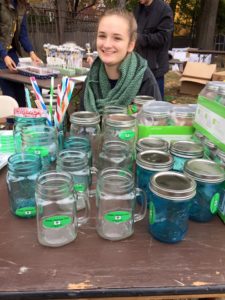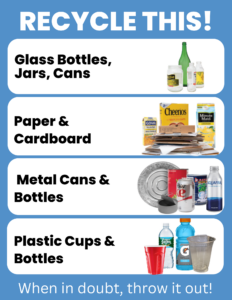Waste Management
Trinity College is committed to setting an example of responsible environmental stewardship by reducing the amount of waste produced through composting efforts, promoting a culture of reuse, and recycling.
Reuse
Need a slightly used microwave or refrigerator? How about some posters to dress up the bare walls in your residence-hall room? Or a mirror so that you can make sure your socks match before heading out the door? You can find those items and more – much, much more – at The Coop, Trinity’s on-campus, student organized and operated thrift store located under the Jackson residence, across from the LSC quad.
If you would like donate gently used items please e-mail [email protected]
Do you have office supplies that you no longer need but don’t want to throw away? Do you have office supply needs but would rather reserve funds for other priorities? If so, you are in luck! The Office of Community Service and Civic Engagement and the Sustainability Office created the Bantam Office Supplies Swap just for you. 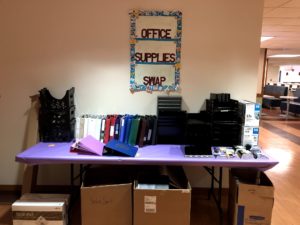
The Bantam Office Supplies Swap, located in the basement of Mather in the area between the Bookstore and the Office of Community Service and Civic Engagement, is a place for members of the Trinity community to donate or take gently used or new office supplies.
The Bantam Book Swap is located by the elevator in the basement of Mather. Both locations run on the same principle, that people donate as well as take items of interest.
The Bantam Office Supplies Swap and Book Swap will be open throughout the year, as long as there is interest and inventory.
Donations can be delivered directly or sent via campus mail to the Office of Community Service and Civic Engagement (Mather basement, next to the bookstore).
Please come by to donate, take what you need, while helping the Trinity community reduce waste. Thank you in advance for your participation. If you have any questions, feel free to contact Joe Barber ([email protected]) or Hayley Berliner ([email protected]).
Trinity’s new Freecycle listserv is intended to connect the Trinity community with others looking to exchange both personal and business-related items for FREE. This can include furniture, office supplies, clothing, electronics, books, and more.
The Underground Coffee Shop and Peter B’s Espresso both offer discounts to customers who bring their own reusable mugs. If you don’t have your own mug when visiting either coffee shop but have the time to sit and enjoy your drink, ask the barista to serve your drink in one of their ceramic mugs. 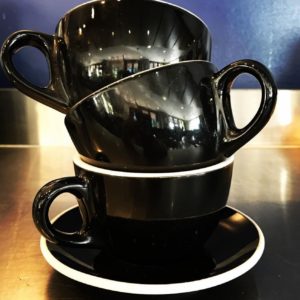
You are also encouraged to bring your own mug to the smoothie station in Mather Dining Hall.
Reduce bottled water purchases by carrying your own refillable water bottle.
Recycle
Trinity College participates in single stream recycling. This type of recycling allows for all recyclable materials to be collected in one bin. Please make sure all recyclable materials are CLEAN and DRY before placing them in the bin.
Please note that:
- Shredded paper is NOT recyclable through single stream recycling
- Paper cups are NOT recyclable
- Styrofoam is NOT recyclable
- Straws are NOT recyclable
- Oily pizza boxes are NOT recyclable
- Plastic cups ARE recyclable if clean and dry
Hard to recycle items can be recycled or donated through the Office of Community Service and Civic engagement. The Community Service Office manages our campus recycling center, located by the south entrance of Mather Hall. At the recycling center you can drop off compact fluorescent light bulbs (CFLs), plastic bags and films, small electronic waste, and alkaline batteries. 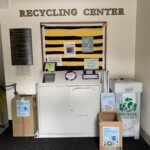
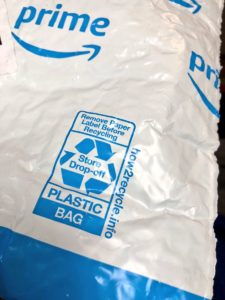 You can recycle your Amazon bubble mailers by putting them in the plastic bag recycling bin at the Recycling Center or Post Office. Learn more about the How 2 Recycle smart label here.
You can recycle your Amazon bubble mailers by putting them in the plastic bag recycling bin at the Recycling Center or Post Office. Learn more about the How 2 Recycle smart label here.
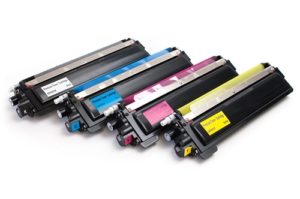 You can also drop off empty ink cartridges the at the community service office to be properly recycled.
You can also drop off empty ink cartridges the at the community service office to be properly recycled.
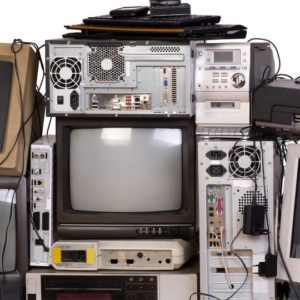
For Larger E-waste please contact [email protected] before dropping items off at the community service office.
Trinfo Café, a community space connecting Hartford and Trinity College, runs a computer recycling program. The donated computers are refurbished and given to community members after completing computer literacy courses. Contact [email protected] for specific requirements when attempting to donate a used computer
After you put recyclable items in the recycling bins, custodians collect the clear bags and bring them outside to trash enclosures or dumpsters. Then, the grounds crew checks the clear bags for contamination. Uncontaminated recycling bags get picked up by ABM’s recycling truck and driven to the Transfer Station in Berlin, CT.
Contaminated bags cannot be recycled and therefore get picked up by ABM’s trash truck and brought to the Transfer Station as trash.
- Beverage containers that still contain liquid
- Smoothie cups from Mather (these are compostable not recyclable)
- Food
- Paper coffee cups
- Non-recyclable plastics such as
- chip bags
- dirty food containers
- Greasy pizza boxes
Compost
All kitchen food scraps in the Bistro, the Cave, and Mather Dining Hall are composted. Diners can also compost their food scraps in Mather, the Bistro and the Cave.
Residents of the Crescent Street Townhouses can request compost buckets for their houses, which are picked up once a week.
The Cultural Houses all have compost buckets as well, which they bring to Trinfo Cafe’s compost pile.
The Smith House and Hallden Hall have compost buckets outside to collect food scraps from events. Faculty and staff can sign up to bring their food scraps from home to be collected in one of these two bins.
At Mather, the Bistro, the Cave, Hallden Hall, the Smith House, and the Crescent St. Townhouses, you can compost:
- All food scraps, including fruits and vegetables, meat, eggshells, bones, and grains
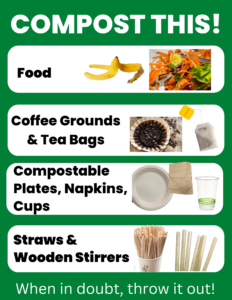
- Coffee grounds and tea bags
- Compostable plates, napkins, and cups
- Wooden stirrers and compostable straws
At the cultural houses, you can compost:
- All food scraps, except for meat and dairy
- Coffee grounds
Anything you compost at the Cultural Houses goes to the compost pile at Trinfo Cafe. This is turned into fertilizer for Trinfo’s Community Garden.
All compost collected anywhere else on campus is picked up by Blue Earth Compost, a West Hartford based company. Blue Earth Compost takes our food scraps to their industrial composting facility in Southington, CT where it is turned into energy.
Food waste makes up 25-30% of the waste in landfills in Connecticut. Food releases methane as it decomposes, a greenhouse gas 25 times more potent than carbon dioxide. By composting, you significantly reduce the amount of waste being sent to landfills and incinerators, and you can turn your waste into good.
Compost is a natural, organic fertilizer that is used on gardens and farms to produce new food. It does not contain high levels of nitrogen or chemicals like inorganic fertilizers do, making it much better for the environment, and it produces healthier food for human consumption.
